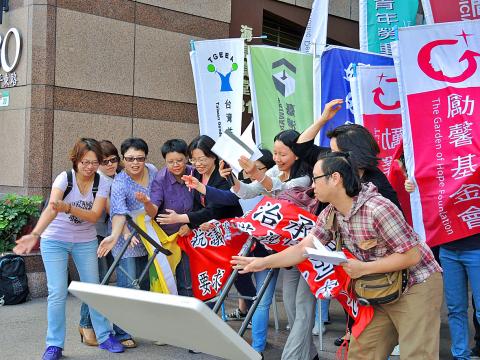The Democratic Progressive Party (DPP) has not only failed to live up to the legacy of Peng Wan-ju (彭婉如), but the government under the nation’s first female president will feature a 40-member Cabinet with just four women, women’s rights groups said yesterday during a protest outside DPP headquarters in Taipei.
During the protest, an article published in yesterday’s Liberty Times (the Taipei Times’ sister newspaper) by women’s rights campaigner Lee Yuan-chen (李元貞) was read out loud.
Lee, who served as national policy adviser to former president Chen Shui-bian (陳水扁), criticized the gender imbalance in the proposed Cabinet.

Photo: CNA
Tsai’s gender equality policy in 2012 promised that the gender ratio in governments — whether local or central, and regardless of pay grade — would at least be one-third women, but the last time there were so few women in the Cabinet was under then-premier Vincent Siew (蕭萬長) in 1997, she wrote. Tsai’s recent predecessors have done better, Lee said, referring to President Ma Ying-jeou (馬英九) and Chen.
Representatives of the Awakening Foundation, the Homemaker Union Consumer Co-op, the Garden of Hope Foundation and other groups put on a short play during the protest, showing Tsai closing a door behind her and picking just male staff.
Lee said she turned down an invitation to Tsai’s post-inaugural banquet because even though she is happy to see Tsai become the nation’s first female president, Tsai has “failed to live up to Peng’s legacy of introducing women to politics in the DPP.”
Peng, director of the DPP’s Women’s Affairs Department before she was murdered on Nov. 30, 1996, in Kaohsiung, is remembered for pushing for a legal amendment guaranteeing that at least one-quarter of all politicians should be female.
Garden of Hope Foundation executive manager Chi Hui-jung (紀惠容) said women’s rights groups will not give Tsai a honeymoon period after her inauguration because of her disappointing performance so far.
The groups plan to closely monitor Tsai’s administration.
Premier-designate Lin Chuan (林全) evidently lacks a sensitivity to gender issues since his Cabinet list includes many middle-aged to elderly men, Chi said, adding that the groups would watch how Lin’s Cabinet handles gender issues.
Executive Yuan spokesperson-designate Tung Chen-yuan (童振源) said that while Lin had reached out to many women, the “current results are not what was anticipated, but we are working toward that goal.”
The incoming government’s policies and decisions would emphasize the different thoughts across genders and seek to encourage women to enter politics, Tung said, adding that the incoming government hoped for “women in government’ to be a mainstream value in Taiwan’s future.

SECURITY: As China is ‘reshaping’ Hong Kong’s population, Taiwan must raise the eligibility threshold for applications from Hong Kongers, Chiu Chui-cheng said When Hong Kong and Macau citizens apply for residency in Taiwan, it would be under a new category that includes a “national security observation period,” Mainland Affairs Council (MAC) Minister Chiu Chui-cheng (邱垂正) said yesterday. President William Lai (賴清德) on March 13 announced 17 strategies to counter China’s aggression toward Taiwan, including incorporating national security considerations into the review process for residency applications from Hong Kong and Macau citizens. The situation in Hong Kong is constantly changing, Chiu said to media yesterday on the sidelines of the Taipei Technology Run hosted by the Taipei Neihu Technology Park Development Association. With

A US Marine Corps regiment equipped with Naval Strike Missiles (NSM) is set to participate in the upcoming Balikatan 25 exercise in the Luzon Strait, marking the system’s first-ever deployment in the Philippines. US and Philippine officials have separately confirmed that the Navy Marine Expeditionary Ship Interdiction System (NMESIS) — the mobile launch platform for the Naval Strike Missile — would take part in the joint exercise. The missiles are being deployed to “a strategic first island chain chokepoint” in the waters between Taiwan proper and the Philippines, US-based Naval News reported. “The Luzon Strait and Bashi Channel represent a critical access

‘FORM OF PROTEST’: The German Institute Taipei said it was ‘shocked’ to see Nazi symbolism used in connection with political aims as it condemned the incident Sung Chien-liang (宋建樑), who led efforts to recall Democratic Progressive Party (DPP) Legislator Lee Kun-cheng (李坤城), was released on bail of NT$80,000 yesterday amid an outcry over a Nazi armband he wore to questioning the night before. Sung arrived at the New Taipei City District Prosecutors’ Office for questioning in a recall petition forgery case on Tuesday night wearing a red armband bearing a swastika, carrying a copy of Adolf Hitler’s Mein Kampf and giving a Nazi salute. Sung left the building at 1:15am without the armband and apparently covering the book with a coat. This is a serious international scandal and Chinese

COUNTERINTELLIGENCE TRAINING: The ministry said 87.5 percent of the apprehended Chinese agents were reported by service members they tried to lure into becoming spies Taiwanese organized crime, illegal money lenders, temples and civic groups are complicit in Beijing’s infiltration of the armed forces, the Ministry of National Defense (MND) said in a report yesterday. Retired service members who had been turned to Beijing’s cause mainly relied on those channels to infiltrate the Taiwanese military, according to the report to be submitted to lawmakers ahead of tomorrow’s hearing on Chinese espionage in the military. Chinese intelligence typically used blackmail, Internet-based communications, bribery or debts to loan sharks to leverage active service personnel to do its bidding, it said. China’s main goals are to collect intelligence, and develop a